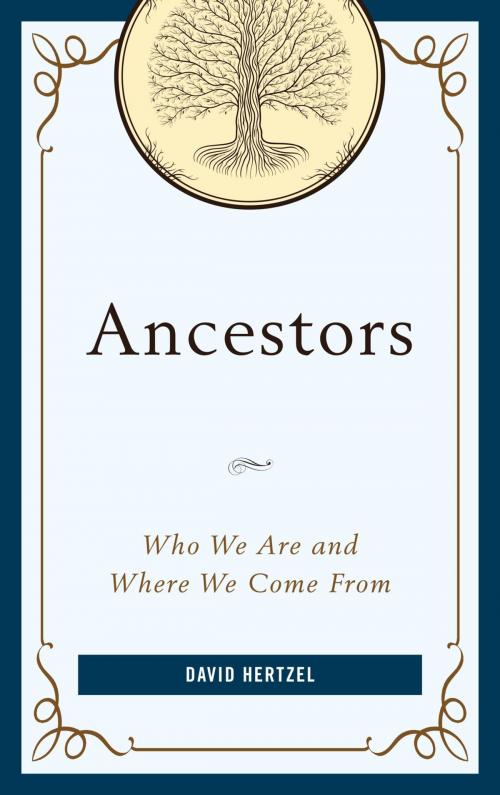Ancestors
Who We Are and Where We Come From
Nonfiction, Social & Cultural Studies, Social Science, Anthropology, History, Americas, United States, Family & Relationships| Author: | David Hertzel | ISBN: | 9781538104378 |
| Publisher: | Rowman & Littlefield Publishers | Publication: | August 3, 2017 |
| Imprint: | Rowman & Littlefield Publishers | Language: | English |
| Author: | David Hertzel |
| ISBN: | 9781538104378 |
| Publisher: | Rowman & Littlefield Publishers |
| Publication: | August 3, 2017 |
| Imprint: | Rowman & Littlefield Publishers |
| Language: | English |
People involve their ancestors in every aspect of culture. Individuals and societies worldwide and throughout history have incorporated ancestors into rituals public and private, religious and secular. Societies often organize their aristocracies, tribes, and other kinship groups around ancestral constructions which are defined through laws and customs governing marriage, naming, guardianship, inheritance, and other social practices. Medical professionals consider ancestral information important to a patient’s diagnosis and to the study of disease; many psychiatrists consider one’s relationship to ancestors important in understanding the mental and emotional disposition of subjects. Ancestry and perceptions of ancestry frequently function as a determinant of personal, ethnic, racial, and national identity. For all its larger philosophical, medical, psychological, and religious implications, one fascinating aspect of ancestry is how passionately many people hold to ‘their own’ ancestry, and to their own perceptions of the same.
In Ancestors, David Hertzel offers an introductory foray into the nature of relationships people today have with their ancestors, and explores the significance of ancestry and ancestral belief in our modern world. Guided by two questions—“who are your ancestors?” and “what is your relationship to your ancestors?”—Hertzel interviewed thirty-five elders and people of prominence within particular social or intellectual communities. Interviewees were accomplished in an area related to ancestry, its nature or its meaning, and included genealogists, geneticists, tribal chiefs and elders, researchers in some aspect of family or ancestry, family elders, and experienced practitioners or supervisors of particular ancestral rituals. Interviewees were selected from a variety of cultural backgrounds for purposes of contrast, comparison, and breadth—but they are not spokespeople and were not asked to ‘represent’ particular belief systems, doctrines, or Peoples. Rather, the interviewees describe their own personal experiences and beliefs involving ancestors.
From these interviews, Hertzel identifies common themes to ancestral practices and beliefs, such as the way we sanctify our ancestors, how we create a living narrative of our ancestry, and how experiences like suffering and love are shared across generations and appear to transcend death. Excerpts from interviews serve as examples throughout his narrative exploration of the concept of ancestry; a selection of full interviews are embedded throughout the text and offer glimpses into the diversity of ways that people think about who they are and where they come from.
People involve their ancestors in every aspect of culture. Individuals and societies worldwide and throughout history have incorporated ancestors into rituals public and private, religious and secular. Societies often organize their aristocracies, tribes, and other kinship groups around ancestral constructions which are defined through laws and customs governing marriage, naming, guardianship, inheritance, and other social practices. Medical professionals consider ancestral information important to a patient’s diagnosis and to the study of disease; many psychiatrists consider one’s relationship to ancestors important in understanding the mental and emotional disposition of subjects. Ancestry and perceptions of ancestry frequently function as a determinant of personal, ethnic, racial, and national identity. For all its larger philosophical, medical, psychological, and religious implications, one fascinating aspect of ancestry is how passionately many people hold to ‘their own’ ancestry, and to their own perceptions of the same.
In Ancestors, David Hertzel offers an introductory foray into the nature of relationships people today have with their ancestors, and explores the significance of ancestry and ancestral belief in our modern world. Guided by two questions—“who are your ancestors?” and “what is your relationship to your ancestors?”—Hertzel interviewed thirty-five elders and people of prominence within particular social or intellectual communities. Interviewees were accomplished in an area related to ancestry, its nature or its meaning, and included genealogists, geneticists, tribal chiefs and elders, researchers in some aspect of family or ancestry, family elders, and experienced practitioners or supervisors of particular ancestral rituals. Interviewees were selected from a variety of cultural backgrounds for purposes of contrast, comparison, and breadth—but they are not spokespeople and were not asked to ‘represent’ particular belief systems, doctrines, or Peoples. Rather, the interviewees describe their own personal experiences and beliefs involving ancestors.
From these interviews, Hertzel identifies common themes to ancestral practices and beliefs, such as the way we sanctify our ancestors, how we create a living narrative of our ancestry, and how experiences like suffering and love are shared across generations and appear to transcend death. Excerpts from interviews serve as examples throughout his narrative exploration of the concept of ancestry; a selection of full interviews are embedded throughout the text and offer glimpses into the diversity of ways that people think about who they are and where they come from.















